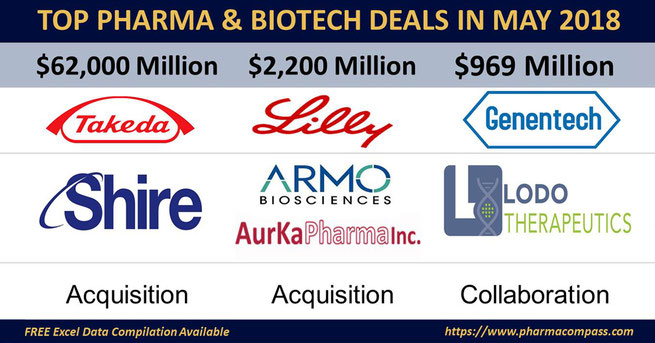Top Pharma & Biotech Deals, Investments and M&As in May 2018

As April 2018 breezed past with news of Novartis’ US$ 8.7 billion buyout of AveXis, May set the temperatures soaring with one of the largest pharma acquisitions in recent years. Japanese drugmaker Takeda Pharmaceutical agreed to buy British drugmaker Shire for US$ 62 billion (£45.3 billion) in the biggest pharma M&A deal of the year.
In a month that witnessed extensive deal making, Eli Lilly announced its commitment to spend over US$ 2.2 billion to acquire immuno-oncology companies — ARMO Biosciences and AurKa Pharma, while Genentech signed a deal worth US$ 969 million with Lodo Therapeutics to discover novel molecules with therapeutic potential against multiple disease-related targets of interest to Genentech.
AstraZeneca was also busy last month as it expanded its collaboration with the UK-based Bicycle Therapeutics by signing a wide-ranging deal to develop novel small molecule medicines for respiratory, cardiovascular and metabolic diseases.
Will Takeda-Shire’s US$ 62 billion deal go through?
Japanese drug maker Takeda Pharmaceutical Limited clinched Ireland-based Shire for a hefty price tag of US$ 62 billion (£46 billion). Together, they have almost made it to the league of the 10 largest drug companies. Takeda’s first non-Japanese CEO, Christophe Weber, envisions the new entity as a global pharmaceutical giant with its roots in Japan, along with becoming a leader in gastroenterology, neuroscience, oncology and rare diseases. The transaction has been approved by the boards of both the companies. It is expected to close in the first half of 2019. Upon closing of the transaction, Takeda shareholders will own approximately 50 percent of the combined group.
However, Takeda’s board faces stiff opposition from a group of shareholders who say the buyout will shrink the value of Takeda’s shares. The small group of Takeda shareholders comprising the drug maker’s ex-employees has achieved sizable support in its opposition to the company’s deal.
This 130-member group comprising ex-Takeda employees holds one percent of the drug maker’s shares and needs to secure a third of shareholder votes. The group also includes members of the founding Takeda family which holds about 10 percent of Takeda shares, as reported on Nikkan Yakugyo, a Japanese daily. Reuters reported earlier this week that Takeda “will hold the shareholder meeting later this year or early next year to approve an issue of new stock to help fund the Shire deal, making it a de facto vote on the deal itself.” This rebel group of shareholders is “working steadily to increase support” for blocking the deal among domestic retail investors and overseas institutional investors who own 25 percent and 35 percent of Takeda shares respectively, Reuters noted.
Last year, this shareholder group had tried preventing the appointment of outgoing Chairman Yasuchika Hasegawa to an advisory position at the company. The proposal stood defeated at the company’s annual general meeting then, since it had gained only 30.5 percent of votes.
After discovering drugs from soil, Lodo rakes in almost US$ 1 billion from Genentech
Lodo Therapeutics Corporation, a drug discovery and development company focused on identifying bioactive natural compounds directly from soil bacteria, announced it had formed a strategic drug discovery collaboration with Genentech, a member of the Roche Group.
The Genentech collaboration has Lodo receiving an undisclosed upfront payment and becoming eligible to receive research, development and commercialization milestone payments of up to US$ 969 million. In addition, Lodo is eligible to receive tiered royalties on sales of certain products resulting from the collaboration.
Two months before the Genentech deal was announced, Lodo published its discovery of a new class of antibiotics called “malacidins” in the journal Nature Microbiology. Malacidins, discovered from soil, attack an essential part of the bacterial cell wall in a unique way compared to other existing calcium-dependent antibiotics. They annihilate several bacterial diseases that are resistant to most existing antibiotics, including the superbug MRSA. Experts say this approach offers fresh hope in the antibiotics arms race and may be able to reduce the time and cost of drug discovery.Dr. San Brady’s team at New York’s Rockefeller University — the researcher whose vision inspired the founding of Lodo Therapeutics — has devised a gene sequencing technique that can analyze more than 1,000 soil samples which became the basis for the company’s genome mining platform.

